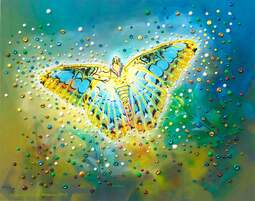 Human life is an ideological flow, a movement from crudity to subtlety, a movement from animal existence to sublime being. In this movement, there is both joy and sorrow. There are times when it feels as if the world is all coming your way, when you feel very good about yourself, about your circumstances. And there are times when you feel there is great difficulty in your life, things that cause you great pain. Many times, in life there, is a mixture of those circumstances that cause pain, and those that bring joy. This human world, this material world is one of transient forms, as you all know. Because it is transient there is that which comes to life, which grows and develops, that which sustains, and that which degrades, dissolves, and is no more. It is natural in human life that there is grief, there is loss. Not only loss of loved ones, loss of abilities, loss of health, loss of social status, and loss of money, but many losses occur in human life. And there is also, in addition to those losses, the ability to gain, to become that which you want to be. Loss and accomplishment are both part of the human experience. It is not the experience itself that determines your happiness, that determines the quality of your life, but your relationship to that experience. If you feel that with the losses you are completely adrift, or with the accomplishments and achievements and gains that you are on top of the world, you swing back and forth, back and forth, but all of that swinging is occurring on the outside of your being. Your mind is engaged with the external world, the senses of the body, and the perceptual field of duality. It is possible to have the same set of circumstances that are at times grievous, and at times joyous, and move within yourself to a different relationship to this human experience. The human experience does not change - the times can be difficult, very difficult. But what does change is your relationship to it, and as you continue to do Brahma sadhana, to ideate on the infinite, the divine Brahma, your relationship with this transitory existence changes because you are now a part of something greater. You see yourself as a part of something more, a part of something profound. When that divine presence comes into your life, when through your efforts in meditation to bring your mind into a relationship, your heart into a relationship with the infinite, and then through the grace of that divine one, that presence comes to you, becomes a part of your existence. Then you know, you become a presence, a consciousness that is partially engaged in these highs and lows of life but is also engaged in the equanimous flow of infinite being, that your divine guide, your divine Beloved, the divine manifesting in your life is a pervading presence—a love that sustains through the good times and the hard times. A love that carries you through it all. When your heart and mind flow in relationship to the infinite, you become in the world but not of it, able to live this life but see that both the pain and the pleasure, the loss and the acquisition are both parts of a whole that in each there is a dance of creation. There is light and shadow that forms a whole of being in this creative world. But in the light and shadow, there is something that sustains, something that maintains through a thread through it all. When your mind and your heart connect with that thread, that wave that flows through pleasure and pain, that flows through all the variety of experiences that can occur, you become connected to the soul, to the atman, and thus to the Paramatman. You become part of this divine presence, knowing that this presence is in all and everything, and though there is in the world of form, the continual appearance of change, that truly there is no change. There is a love that sustains, a being that always is the same. 
0 Comments
Leave a Reply. |
Author
|
Categories
All
Dharma
Forgiveness
Intro To Yama & Niyama
Living In Harmony
Niyamas
Spiritual Activism
Spiritual Awakening
The Nature Of Love
What Are The Niyamas
What Are The Yamas & Niyamas
What Is Gratitude?
Yamas

 RSS Feed
RSS Feed